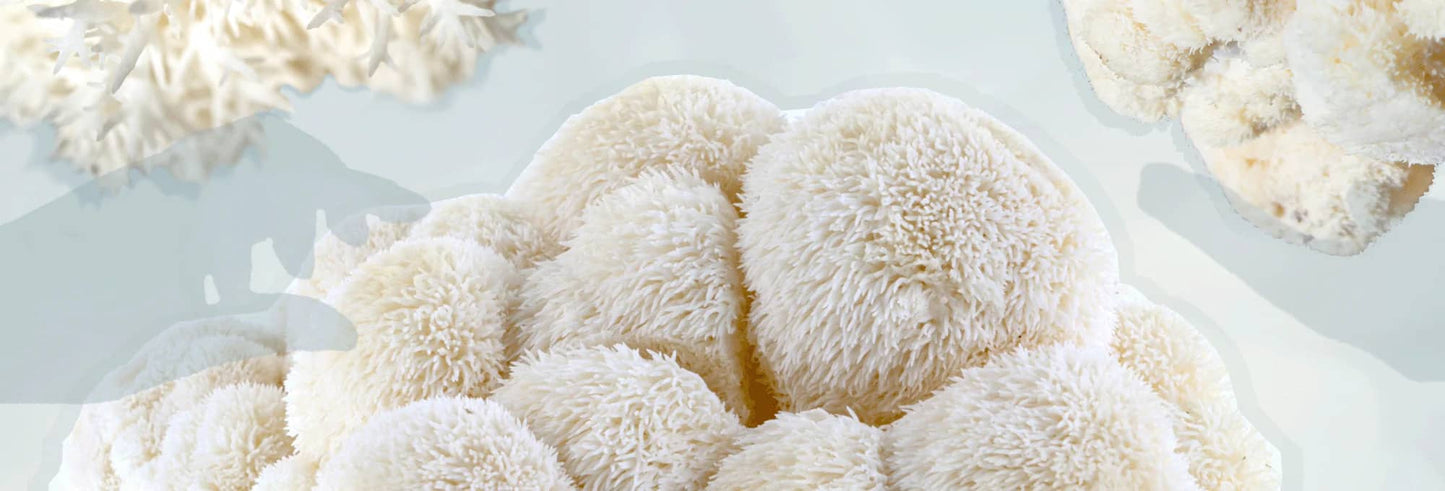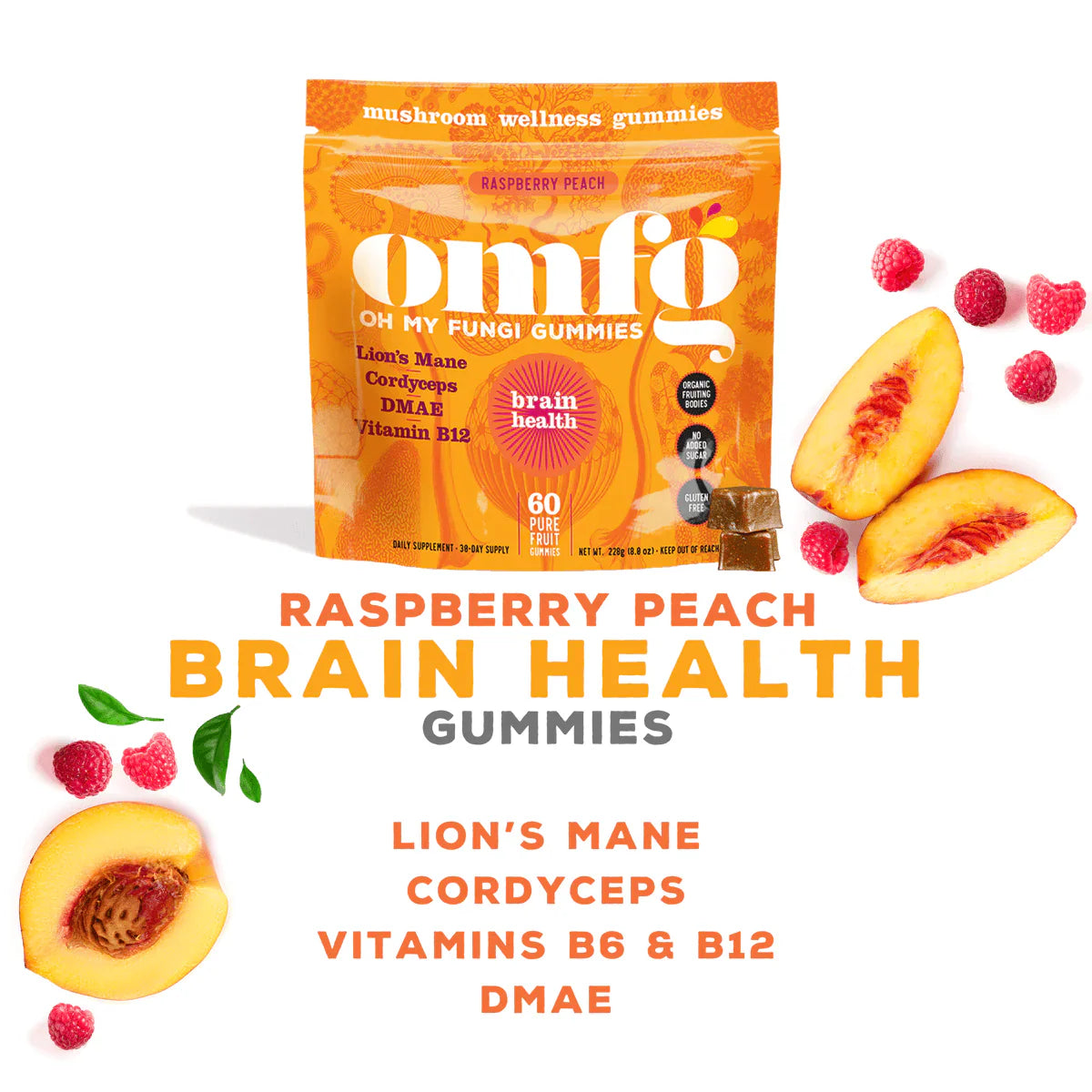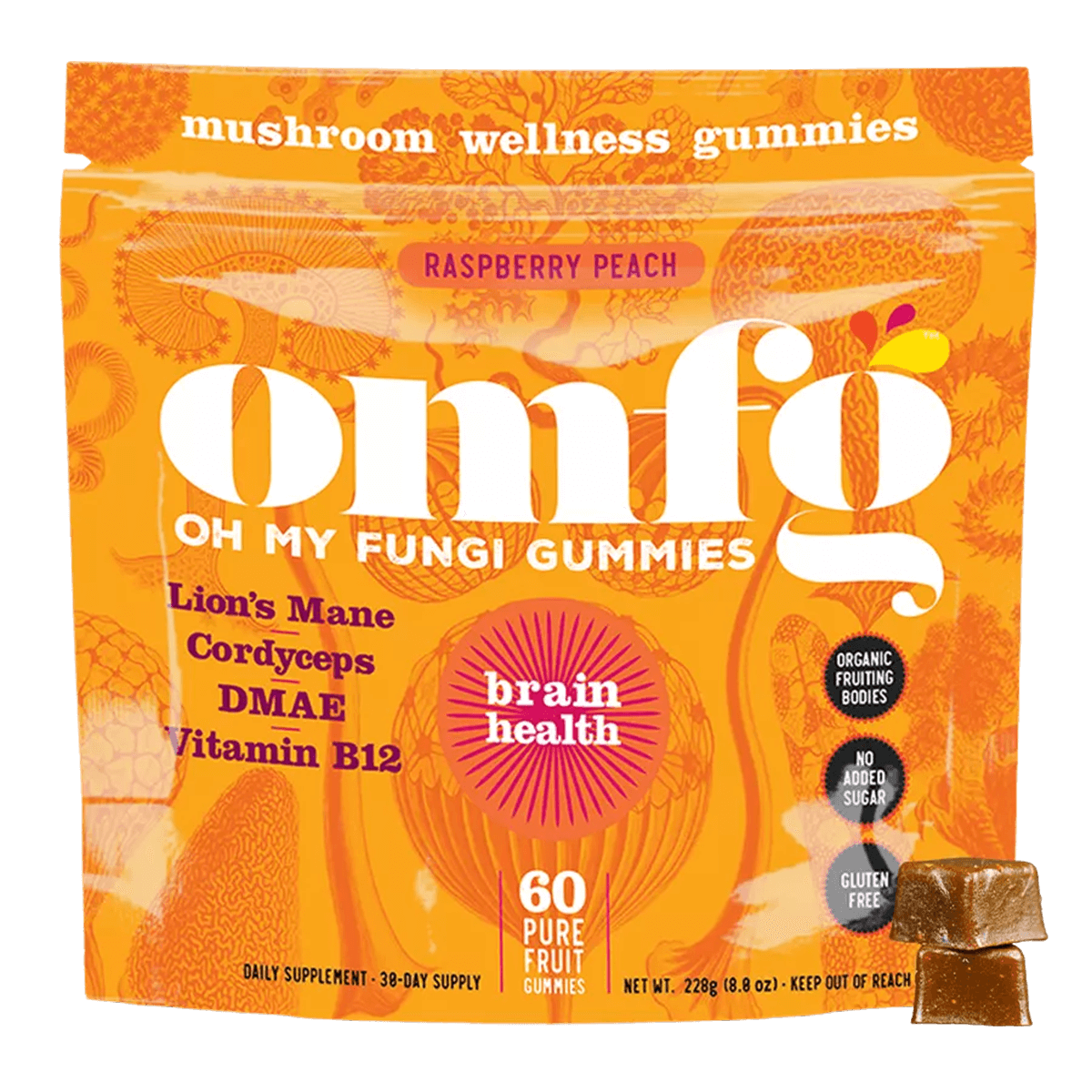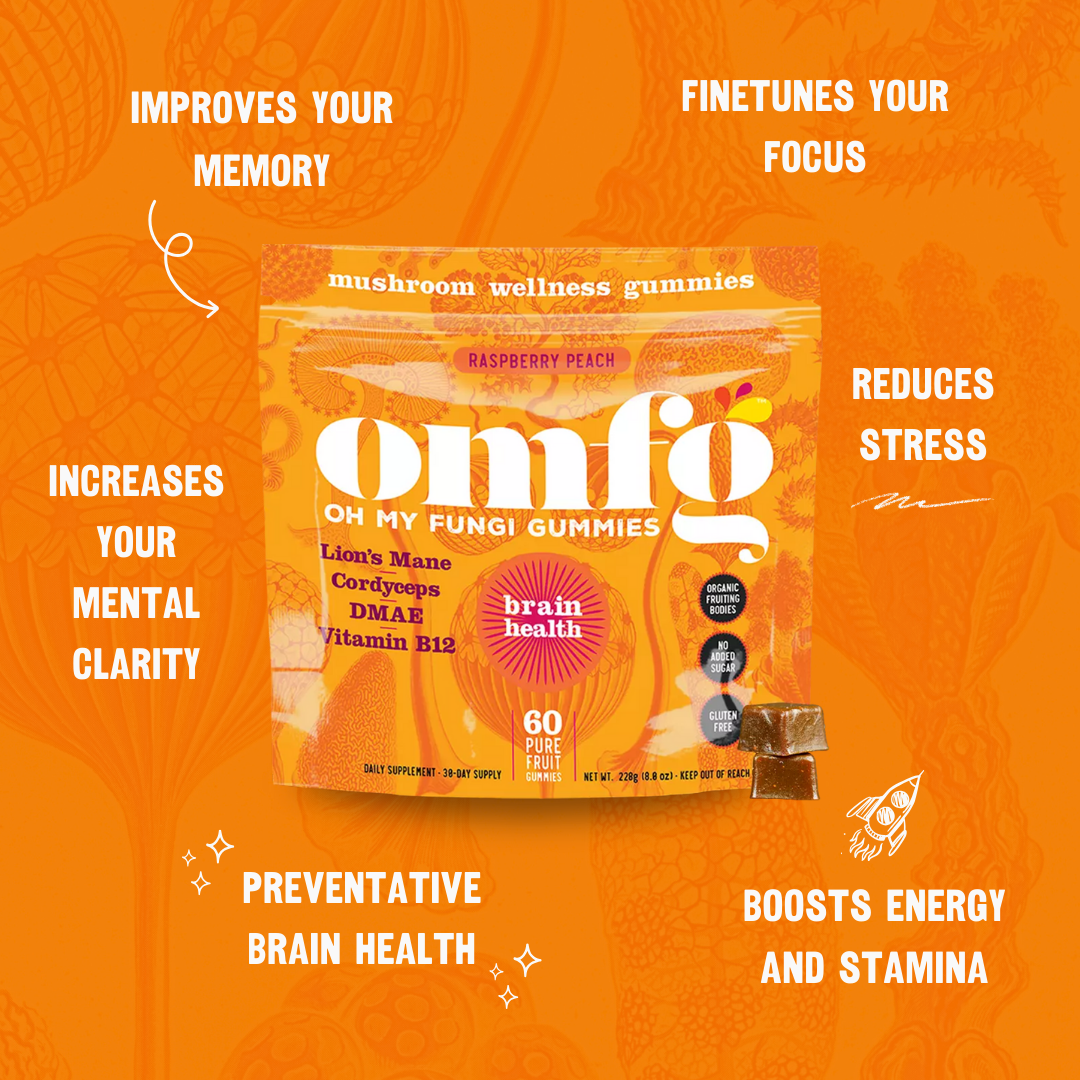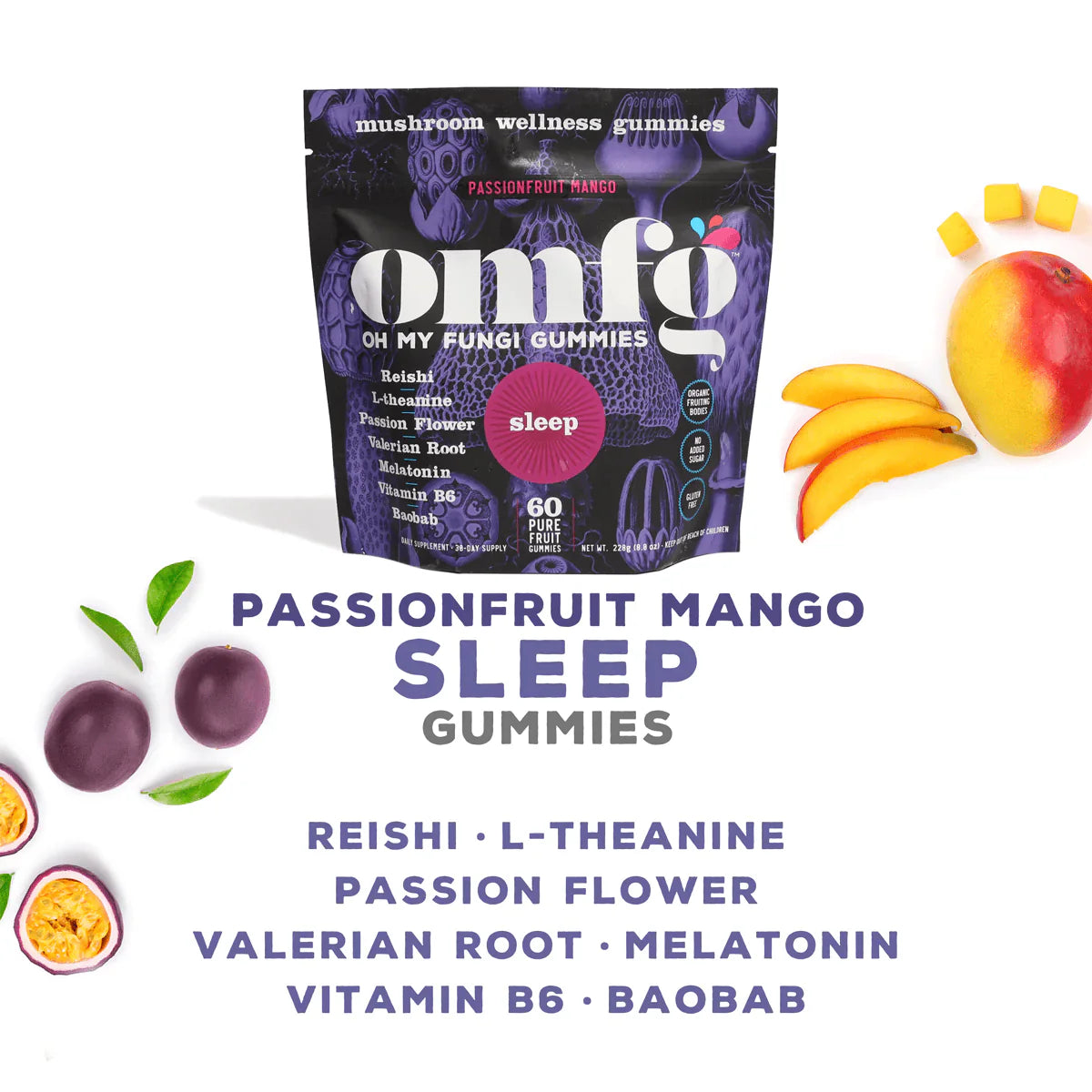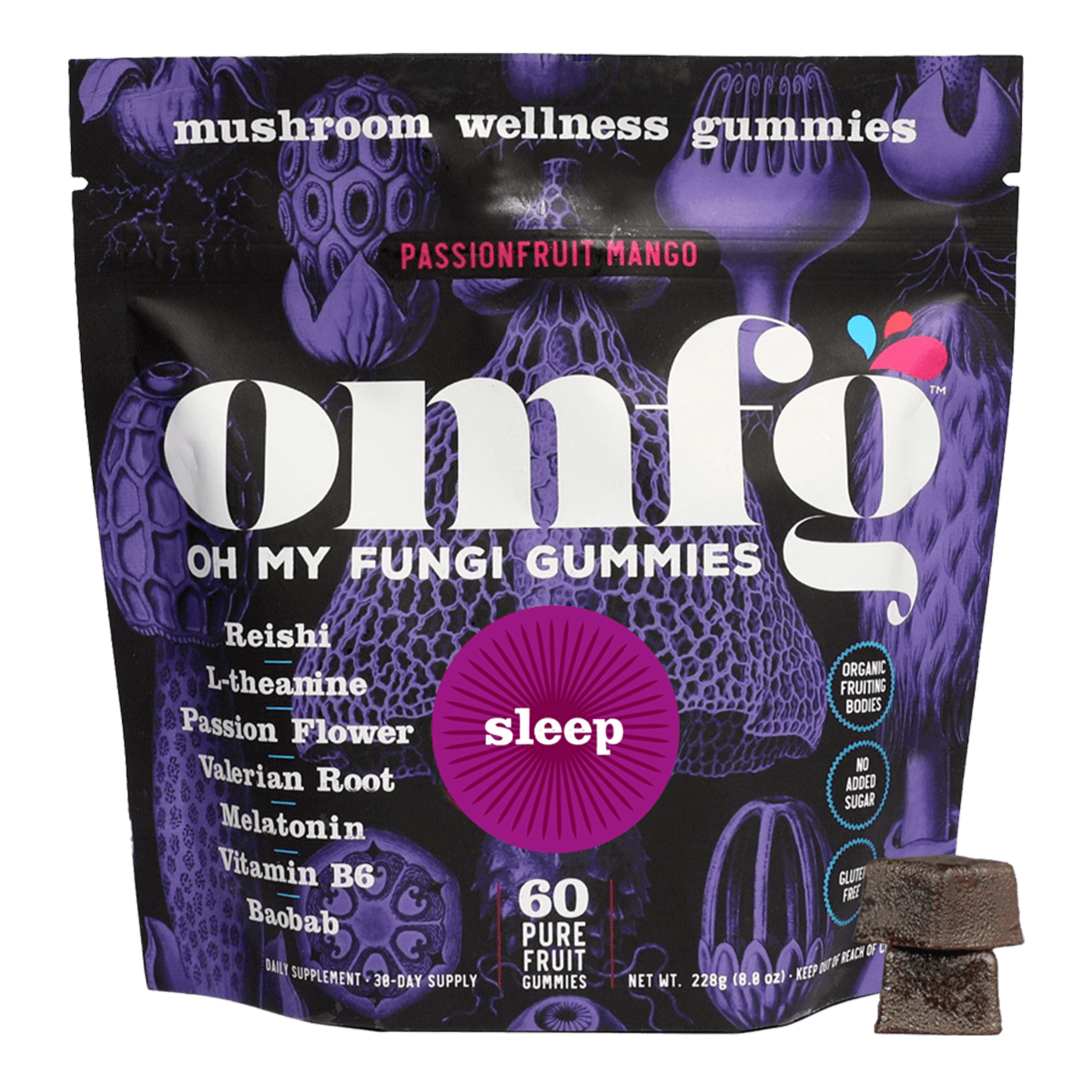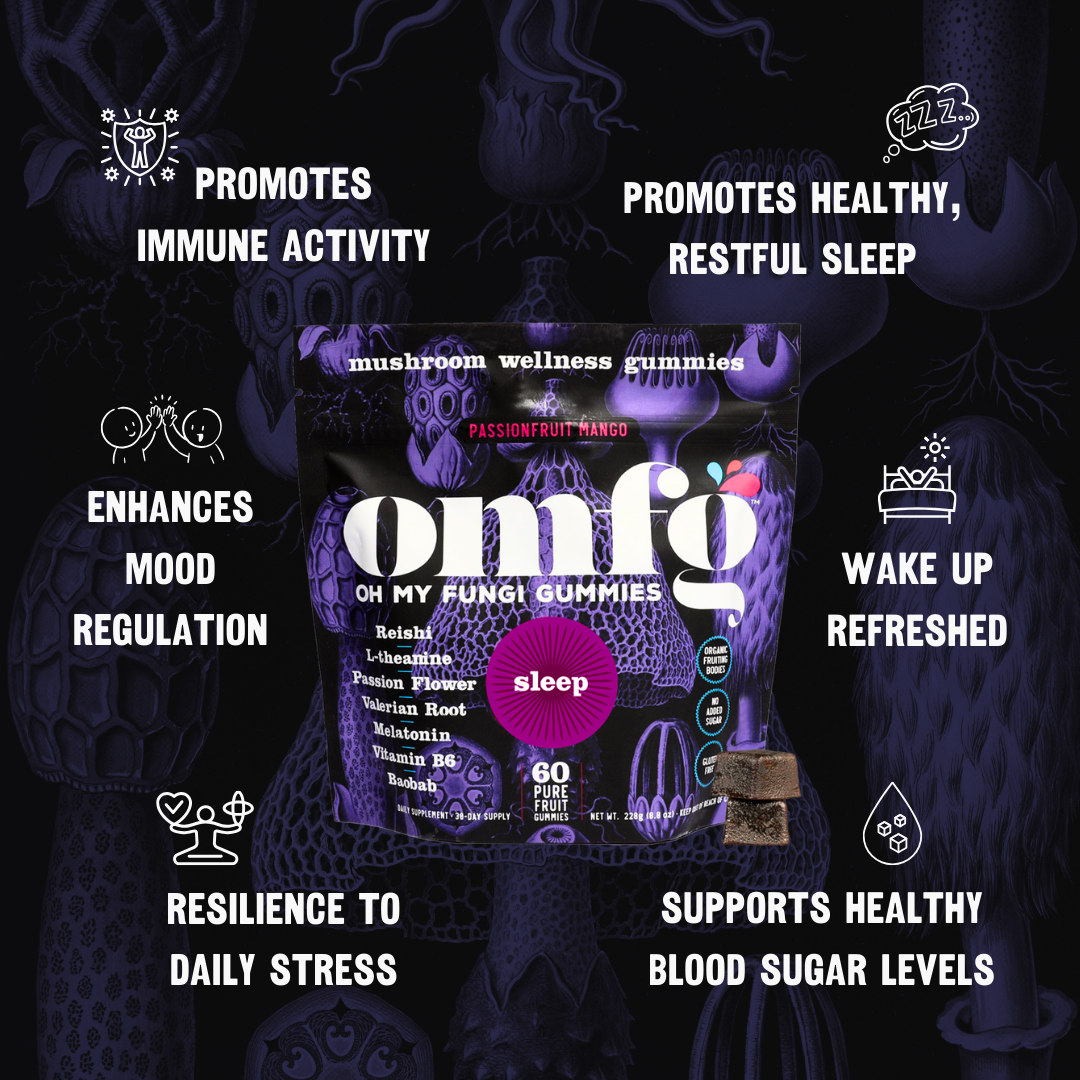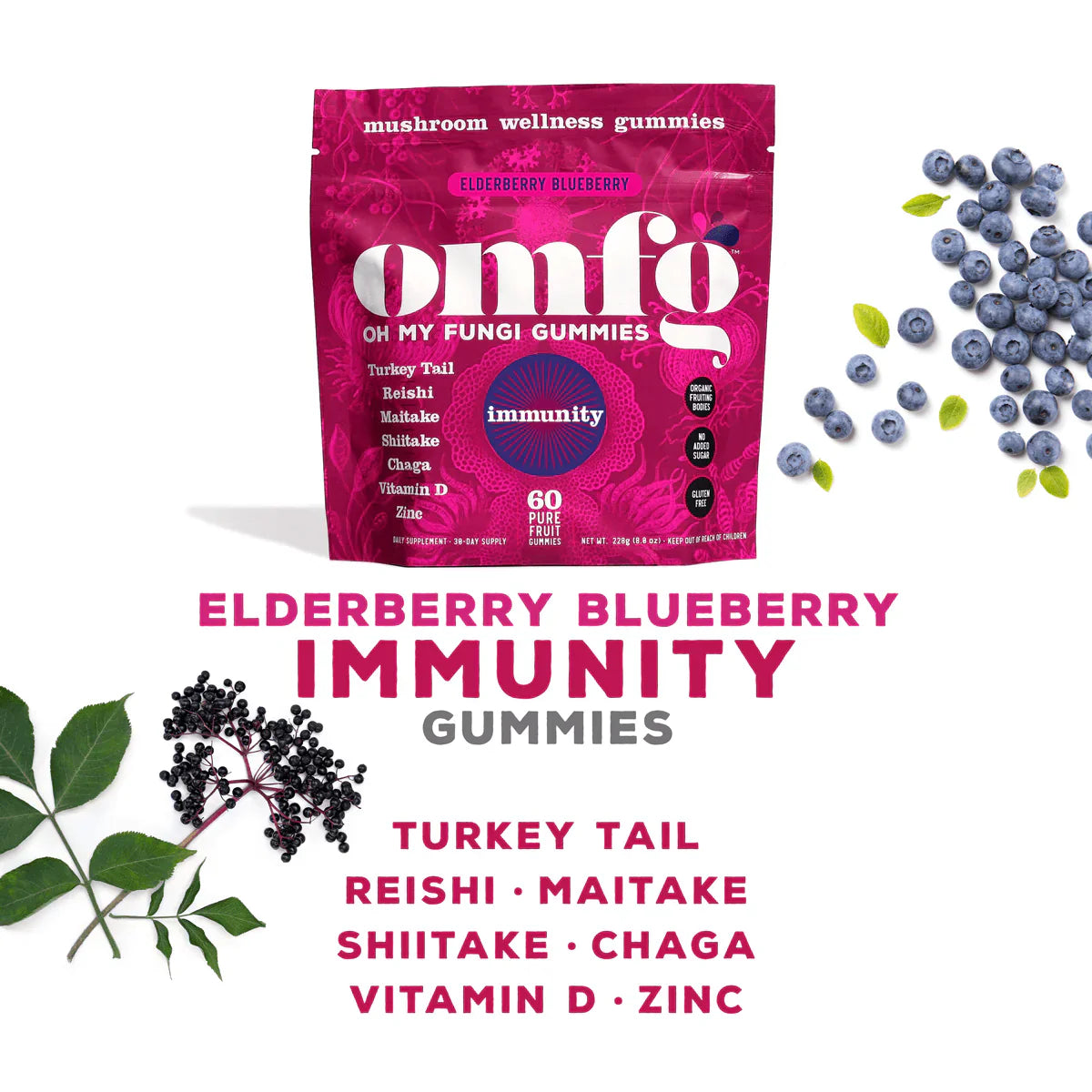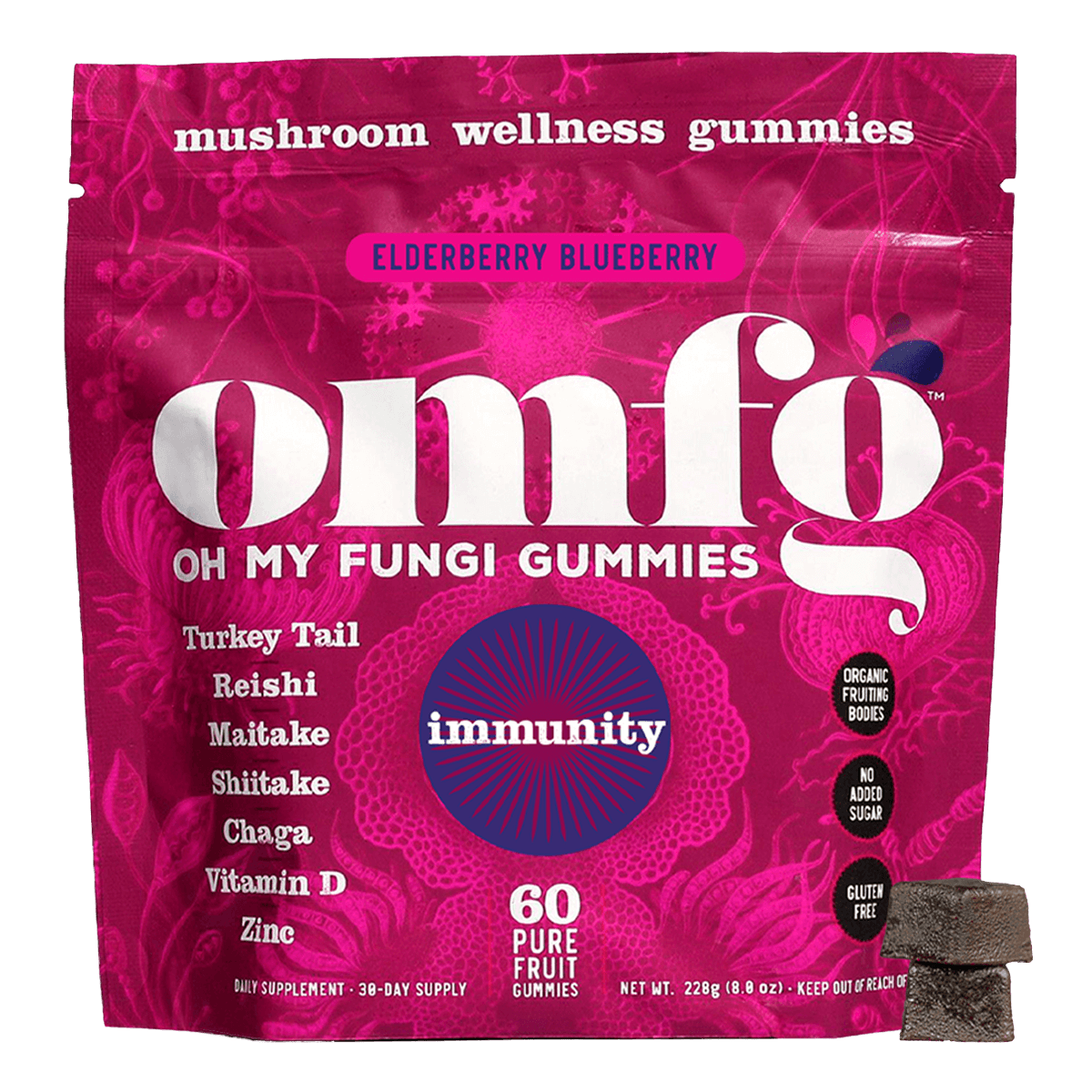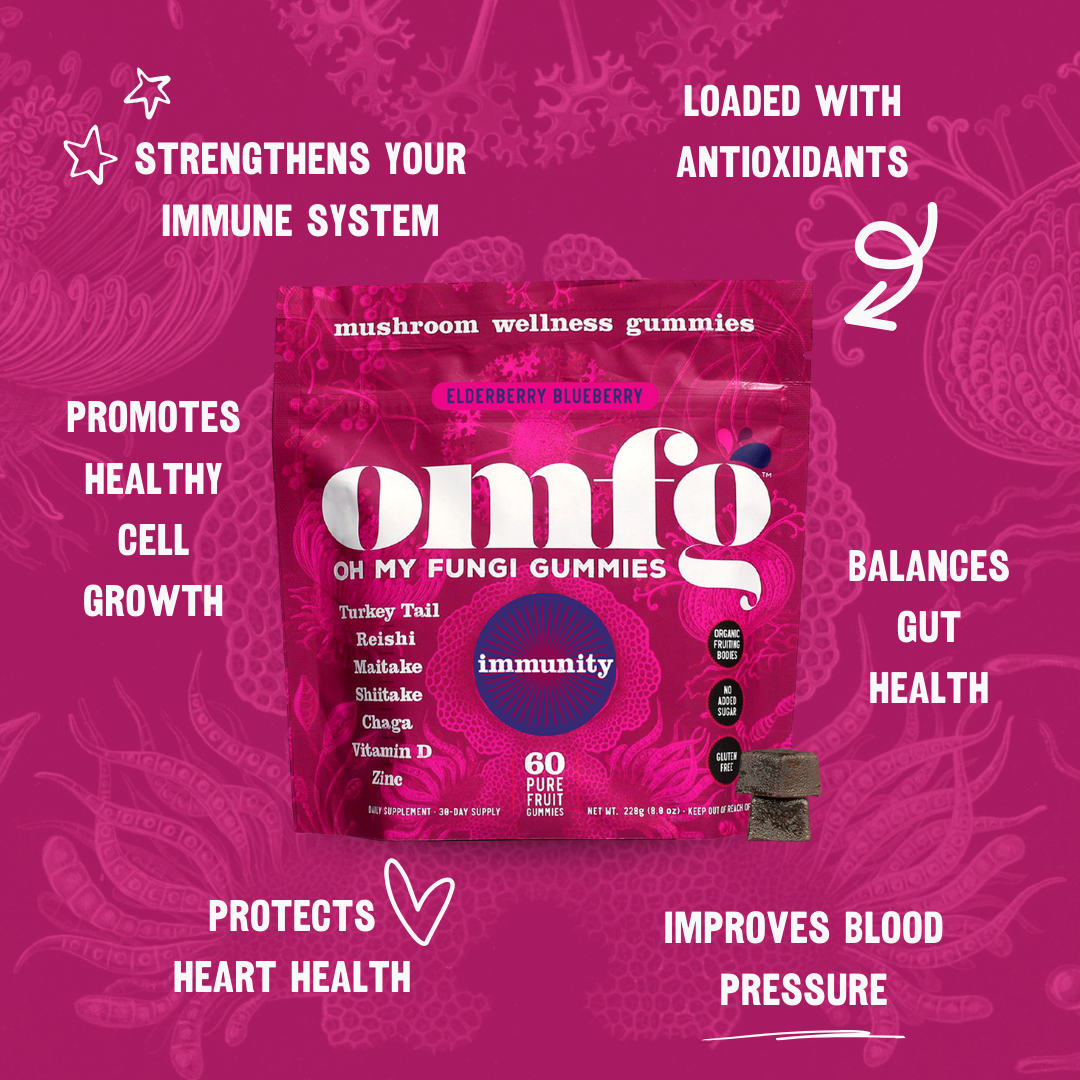‘Lion's mane may be our first 'smart' mushroom. It is a safe,edible fungus that appears to confer cognitive benefits on our aging population.’
- Paul Stamets
5 fun facts about Lion’s mane (Hericium erinaceus)

- Lion’s mane actually stimulates the growth of neurons in the brain
- It is one of the only nootropics that is also a culinary delight
- It has potential to alleviate depression
- It is also known as Monkey’s Head, Bearded Fungus, Pom Pom and Hedgehog mushroom
- Studies show it may accelerate the healing of wounds
Lion's Mane can be found in OMFG Brain Health mushroom gummies.
Where Does Lion's Mane Grow Naturally?
Behold the wonder-shroom Lion’s Mane - a white, shaggy, fungus that looks like something out of a fairy tale, with its creamy-white cluster of fruiting bodies amassed like the mane of nature’s mightiest cat. Also known by its scientific nomenclature, Hericium erinaceus, Lion’s Mane mushrooms can be found growing in wide distribution across the forests of North America, Europe, and Asia.1
Like all the other functional mushroom superstars that we include in our OMFG Mushroom gummies, Lion’s Mane Extract has antioxidant and immuno-modulatory characteristics.
Health Benefits of Lion's Mane Mushrooms
This majestic and adaptogenic mushroom contains compounds with a wide array of beneficial properties and potential applications for functional medicine.2 There is a standout distinction with Lion’s Mane, which explains why it is quickly becoming a household name among Boomers and Gen-X'ers for it’s support in warding off cognitive decline. While there is so much we can say about this functional fungi, today we will mostly focus on the topic of neural regeneration and what the benefits of Lion's Mane are for the aging brain —something all humans will deal with.
In the scientific community, the Lion’s Mane mushroom is well known for its neurotrophic properties4 (‘neuro’ means ‘nerve’ and ‘troph’ means ‘nutrient’). Neurotrophins are proteins that are secreted in the brain that govern the growth, survival, and plasticity of neurons in the central nervous system.5 As we know, like all human tissues, neurons degenerate over time. They become rigid, or die off and don’t regenerate. Certain diseases accelerate this process, such as Alzheimer’s or Parkinson’s.

Some of the molecules that give Lion’s Mane its Beneficial properties are found exclusively within this Species of fungus.
You may be wondering what neurons actually do. Basically, they are the information couriers of the nervous system, sending signals via electrical impulses or chemical messengers to instruct other neurons, glands, or muscles.6 They control just about every mental and physical function in the human body, so it’s a very big deal when they decline or cease to function.
So how can we protect our precious neurons? Even better, how do we encourage them to keep developing as we age and keep on growing?
Lion's Mane and Brain Health
You might have heard about people ‘training’ their brain into having more plasticity by doing activities to keep the brain active and engaged, such as driving a different way home or doing crossword puzzles. This is one methodology to stave off neuronal rigidity and preserve brain health. There are also supplements you can take, called nootropics. A simple dictionary definition of nootropics is ‘a substance that enhances cognition and memory and facilitates learning’.7 You have certainly heard of, and doubtless partaken in the most widely-used one: caffeine.
A nootropic is a substance that enhances cognition and memory and facilitates learning.
Here’s the bonus quiz question: What substance is all-natural, a nootropic, and is brimming with neurotrophic properties, and also gilded with the added benefits of powerful antioxidant and health-promoting compounds? Yup, our furry fungus, Lion’s Mane.
Like all the other functional mushroom superstars that we include in our OMFG mushroom gummies, Lion’s Mane mushroom extract has high antioxidant and immuno-modulatory characteristics. What makes Lion’s Mane mushrooms exceptional is that its specialized compounds actually stimulate the production of some of the most valuable neurotrophins, Nerve Growth Factor (NGF) and Brain-Derived Neurotrophic Factor (BDNF). 3,9,10 These factors are literally brain food that may help improve brain health.

Lab studies have proven that the above compounds exist in Lion’s Mane and Lion's Mane extract. They’ve also demonstrated that rats and mice injected with amyloid plaques that induce Alzheimer’s, then subsequently treated with the same compounds in Lion’s Mane, showed stunning neural recovery and improvement in memory and cognition.11,12,13 The results highlight the therapeutic potential of Lion's Mane as a treatment for the dreaded Alzheimer’s disease,13 Parkinson’s disease11, and Ischemic stroke.14
We have discussed time and again that the medical community is not entirely satisfied with extrapolating the results of animal studies or in vitro assays (aka ‘petri dish’ studies) and applying them to humans, but the science that is there is compelling. There are already some studies being conducted on humans with Lion’s Mane compounds that are yielding impressive results. A Japanese study conducted in 2009 targeted older adults with mild cognitive impairment and found that consuming 3 grams of Lion’s Mane mushroom supplement daily for four months significantly improved mental functioning, but these benefits disappeared a month after supplementation stopped.15 Clearly the take-home on that is that you need to keep eating those Brain Health gummies on the daily for the duration!
Other studies point to Lion’s Mane being a potential treatment for depressive mood disorders.
In addition to potentially improving brain health, other studies point to Lion’s Mane extract being a potential treatment for depressive mood disorders; a study regarding depression and post-menopausal women16 shows promise just based on results alone. And yet another article theorizes that ‘based on the neurotrophic and neurogenic pathophysiology of depression, H. erinaceus may be a potential alternative medicine for the treatment of depression’.17 These are exciting findings and we are looking forward to learning about future developments using this amazing functional mushroom. And, by virtue of the fact that there are no reported adverse effects18,19, in neither lab animals nor humans even at high doses, why not try them?
We will certainly re-visit this wise old mushroom again, as we barely scratched the surface of its phenomenal functional properties, but if you are wondering why we put it in our Brain Health gummies - one whole wondrous gram of it - well, now you know.
SOURCES
1. https://www.forestwildlife.org/lions-mane-mushroom/ (field bio data)
2. https://pubmed.ncbi.nlm.nih.gov/23735479/ (overview)
3. https://pubmed.ncbi.nlm.nih.gov/26244378/ (chemistry and properties)
4. https://pubmed.ncbi.nlm.nih.gov/24266378/ (Neurotrophic factors)
5. https://www.sciencedirect.com/topics/neuroscience/neurotrophin
6. https://www.ninds.nih.gov/health-information/patient-caregiver-education/brain-basics-life-and-death-neuron
7. https://www.merriam-webster.com/dictionary/nootropic
8. https://www.sciencedirect.com/topics/neuroscience/nerve-growth-factor (NGF)
9. https://pubmed.ncbi.nlm.nih.gov/29509661/ (NGF/BDNF)
10. https://www.alomone.com/article/role-neurotrophins-synapse-formation
11. https://pubmed.ncbi.nlm.nih.gov/29951133/ (neural health/rats)
12. https://pubmed.ncbi.nlm.nih.gov/27350344/ (alzheimers/mice)
13. https://pubmed.ncbi.nlm.nih.gov/21383512/(amyloid plaques/mice)
14. https://pubmed.ncbi.nlm.nih.gov/25167134/ (stroke recovery in rats)
15. https://pubmed.ncbi.nlm.nih.gov/18844328/ (human study/cognition)
16. https://pubmed.ncbi.nlm.nih.gov/20834180/ study on menopause and depression
17. https://pubmed.ncbi.nlm.nih.gov/31881712/ (depressive disorder)
18. https://pubmed.ncbi.nlm.nih.gov/27816657/ (non-toxicity in lab rats)
19. https://pubmed.ncbi.nlm.nih.gov/24810469/ (non-toxicity in lab rats

